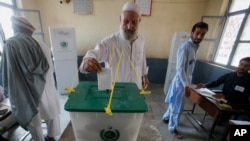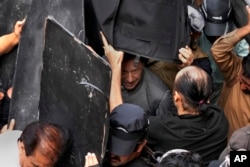Pakistan's lingering political crisis is deteriorating further after election authorities delayed the polls for a key provincial legislature, a move legal experts and politicians are warning could plunge the nuclear-armed country into a constitutional crisis.
The Election Commission of Pakistan, or ECP, tasked with holding national and provincial elections, announced late Wednesday it is moving the vote for the legislative assembly of the Punjab province from April 30 to October 8 after Prime Minister Shehbaz Sharif's government refused to provide the necessary funds and security.
Former Prime Minister Imran Khan's opposition Pakistan Tehreek-e-Insaf party, which was in control of the legislature and that of the Khyber Pakhtunkhwa province, dissolved both in January in a bid to push the government to call snap general elections in the country.
Khan denounced the commission's announcement to postpone the election as a violation of the Constitution.
"For if this is accepted today, then it is the end of the Rule of Law in Pakistan," the populist former prime minister said on Twitter.
"We dissolved our 2 provincial legislatures with the expectation that elections would be held in 90 days as clearly given in our Constitution. We did not take this action to allow a bunch of fascists to impose a reign of terror, violating the Constitution & Rule of Law," Khan wrote.
The federal minister for law and justice, Azam Nazir Tarar, on Thursday defended the election panel's decision to delay the polls until October, when the national parliament also completes its five-year mandatory term.
Tarar told a news conference in Islamabad the government was unable to fund and ensure the safety of the vote in the wake of a "dire economic crisis" and "deteriorating security situation" in Pakistan. He argued that both national and provincial elections must be held on the same day, as has been the tradition in the country.
Khan’s party said the government was shying away from the elections, fearing its defeat.
Legal experts maintained the government and the ECP both were constitutionally bound to organize the vote within 90 days and in line with a recent Supreme Court verdict ordering authorities to respect the deadline outlined in the constitution.
"Disgusted. Yet another dark moment in our sad history. Little men on high chairs," tweeted Salman Akram Raja, a senior Supreme Court attorney, in response to postponing the polls.
Asad Rahim Khan, a lawyer and columnist, said the election panel’s move was "destructive for democracy" in Pakistan.
"The ECP shuttering the polls is violative of the Constitution, a mockery of the law, and contemptuous of the Supreme Court,” he said on Twitter. "This goes beyond voting preferences now: the principle – of the freedom to elect one's representatives – is at stake."
Michael Kugelman, the director of the South Asia Institute at the Washingon-based Wilson Center, said challenges of a looming economic meltdown, a constitutional crisis, political paralysis, institutional breakdowns, and resurgent terrorism are not new to the country.
"Pakistan has confronted all these challenges in the past, but rarely all at once and so acutely. The result is a slow-motion train wreck with no apparent end in sight," Kugelman said on Twitter.
Khan, the cricket hero-turned-prime minister, was removed from office in a parliamentary no-trust vote last April, toppling his nearly four-year-old government and paving the way for the then-opposition leader, Sharif, to become the prime minister of a new coalition government.
Khan has since demanded a new election, calling his removal illegal. Sharif has rejected Khan’s demand, and the government has called for outlawing his party for being a "gang of militants."
Khan has held massive anti-government protest rallies to promote his case, with thousands of people attending the gatherings. Recent surveys indicate Khan is the most popular national politician and his party has swept regional elections held since his ouster.
The 70-year-old politician was shot and wounded during a protest rally last November. Khan accused Sharif and an unnamed army general, among others, of plotting to kill him. Since then, he has largely confined himself to his home in Lahore, the capital of Punjab, and urged the courts to allow him to appear virtually in legal cases because of threats to his life.
Khan says the government has instituted more than 100 "fake" legal case challenges against him since his removal from power, including terrorism, blasphemy, corruption, and sedition charges. He rejects the allegations, saying they are part of efforts by Sharif and the powerful military to have him arrested or disqualified from national politics in the wake of his party's popularity and sweeping victories in recent elections.
The government denies the charges, saying Khan is avoiding accountability for his alleged wrongdoings while in office.
Thousands of PTI supporters have clashed with Pakistani security forces in recent days, injuring dozens of people on both sides. The violence erupted last week when police raided Khan's residence in Lahore to try to arrest him and later in the Pakistani capital, Islamabad, where he made a court appearance.
The Sharif government has since unleashed a crackdown on the PTI, rounding up hundreds of its workers and second-tier leaders on terrorism charges and for other criminal offenses.
Critics say Khan is being punished for questioning the military's involvement in politics.
The prestigious English language DAWN newspaper warned in an editorial this week against treating the country's largest political party as a "terrorist outfit."
The government "seems to be borrowing even its vocabulary from a dictator's playbook," the editorial read. "History will not judge kindly those who throw the laws of this land in the bin in their blind desperation to keep just one man and one political party away from power."
Human Rights Watch on Tuesday accused Pakistani police of using "abusive measures" in an escalating confrontation with Khan's supporters, such as striking them with batons, firing tear gas, water cannon, and rubber bullets, and detaining them under sweeping counterterrorism laws.
"The use of Pakistan's vague and overbroad anti-terrorism provisions against opposition protesters is very worrying," said Patricia Gossman, the associate Asia director at the U.S.-based watchdog, in a statement.









